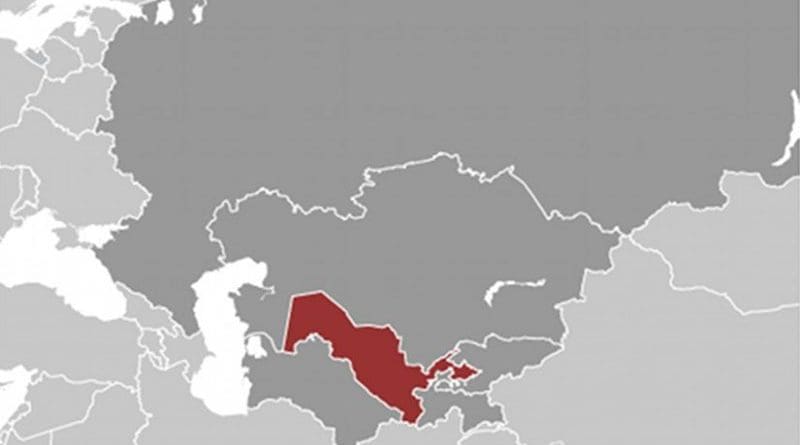Tashkent Mistakenly and Dangerously Conflates Muslim Religiosity with Islamist Extremism
By Paul Goble
Uzbekistan President Islam Karimov and his government are confusing the high level of religiosity among Muslims in their country with Islamist extremism, according to a group of independent analysts, and as a result, they are fighting the former and unintentionally fostering the latter even as they discredit the idea of a secular state.
The Expert Working Group of Uzbekistan, an independent group of Uzbek intellectuals there and abroad, draws that conclusion in a detailed 7,000-word study released this week about the state of Islam in Uzbekistan and the complicated relationship between Muslims and the Uzbekistan government (news.ferghana.ru/archive/2010/politikaislama.doc).
Prepared by Kamoliddin Rabbimov, an Uzbek specialist who worked at the USA Institute in Tashkent 2003-2005) but who now lives in exile in France, the report argues that Uzbekistan is a place where given “the decline of other value systems such as liberal democracy and national independence, Islam has preserved its position” in the mass consciousness of Uzbeks.
And while it is “incorrect to consider Islam in Uzbekistan as an opponent of the secular and liberal path of development of the country” – “Islam [there] still does not have its own political program” – “in the post-Karimov epoch, the social-political status of Islam will be reconsidered” over the course of time.
Surveys conducted over the last 15 years show, the report continues, that far more people in Uzbekistan consider themselves Muslims first rather than Uzbeks first and that if one adds to the former the number who say that the two cannot be divided, there are now more than four times as many whose primary identity is Islamic rather than secular.
Given the centrality of Islam for most Uzbeks, the Karimov regime has “not fought with Islam as such.” Instead, Tashkent today “has set itself a task of a different character, namely to lower the level of the religiosity of society and hold it at a level that is comfortable for the powers that be.”
“The current leaders of Uzbekistan see in Islam,” the report says, “a generator of protest attitudes among the population. That is, they view it as ‘a source of instability and a system that forms threats” to themselves. Thus, “the government sets as its task to control as much as possible all processes connected with Islam.”
That represents “a strategic mistake” on the part of the Uzbek leaders, who have “decided to struggle with the level of religiosity” of the population when in fact it is “necessary to struggle with the character of the religiosity of the population,” something which is by its very nature is “enormously” different.
“When one speaks about ‘the character of religiosity,’” the report says, “one has in mind the situation when Muslims begin to use Islam as ‘an ideology of resistance’ against those whom they consider their opponents or with whom they do not agree.” Such people may in fact – indeed, typically are – less religious than those who do not do that.
“In other words,” the report goes one, “the powers that be must clearly distinguish the high level of religiosity [among Uzbeks as a population] from religiously motivated extremism and the terrorism connected with it and not in any case combine them into a single thing and str4uggle against them with equal pitilessness.”
Unfortunately, that is exactly what Tashkent has done, something that has led most observers to conclude one of two things. On the one hand, some argue that what Tashkent is doing is a proper struggle against religious extremism. And on the other hand, others suggest that the Uzbek powers that be are fighting the wrong battle.
In the view of the latter, the regime should be fighting those who make use of Islamist slogans rather than those who are committed to Islam. The report positions itself closer to the latter, arguing that while attachment to Islamic ideas is great in Uzbekistan, Islamism and Jihadism “have not had and do not have” serious influence there.
But the powers that be in Tashkent “think that between religious extremism and a high level of religiosity is a direct interdependence” when in fact the relationship between the two is more complicated and can be reduced to what the Uzbek government believes only if the Uzbek government continues to act as it does.
If the Uzbek government accepted the principles of religious freedom, then it could understand the nature of Islamic criticisms of public policy, something that is very much part of Islamic life but that in and of itself is not a threat to the regime unless the powers that be unintentionally makes it one.
The report gives the following example of this relationship: Uzbek “society uses alcohol and the government is interested in its sale. If the mosques want to criticize the use of alcoholic beverages, they understand that they may clash with the interests of the state.
But if they make peace with the situation, then, according to Islamic law, they are committing a serious sin.”
Still worse, the Muslim leaders recognize that they will “lose legitimacy in the eyes of believers who have a high level of religiosity,” something that can “lead to the growth in the popularity of alternative religious organizations and groups” if the state forces “official” mullahs and imams to toe the state’s line.
Indeed, the report suggests, the construction of a system of Muslim leaders who always go along with the state will not establish control over religious Muslims but rather ensure that the government will lose control over precisely that part of the population, one very large in Uzbekistan, and that at least some of those believers will turn elsewhere for leadership.

